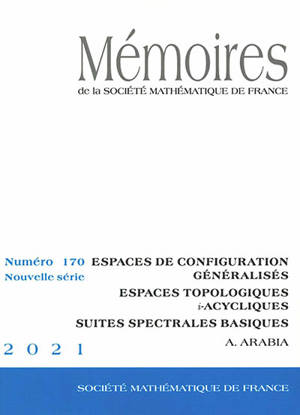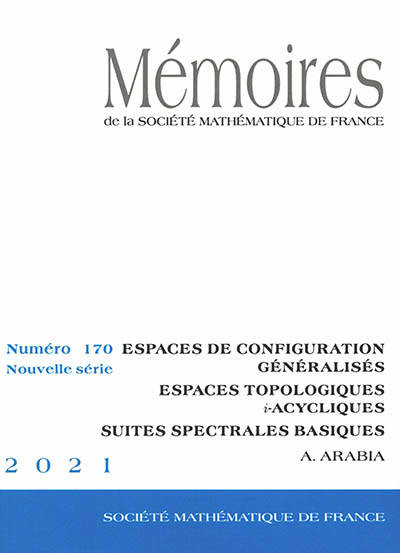
- Afhalen na 1 uur in een winkel met voorraad
- Gratis thuislevering in België vanaf € 30
- Ruim aanbod met 7 miljoen producten
- Afhalen na 1 uur in een winkel met voorraad
- Gratis thuislevering in België vanaf € 30
- Ruim aanbod met 7 miljoen producten
Espaces de configurations généralisées
espaces topologiques i-acycliques
Alberto ArabiaOmschrijving
Ce mémoire présente une nouvelle approche pour l'étude de la cohomologie à supports compacts des espaces de configuration généralisés
∆≤lMm : = {(x1,...,xm) ϵ Mm\# {x1,...,xm} ≤ l},
∆lMm : = ∆≤lMm\∆<lMm et Fm (M) : = ∆mMm,
pour les espaces localement compacts M. L'approche comporte deux volets.
Le premier s'applique uniquement aux espaces i-acycliques, dont la classe contient les espaces contractiles non compacts, et, si X est i-acyclique, contient aussi les ouverts de X et les produits X x M par tout espace M. Pour un espace i-acyclique X, étant donnés i, mϵ N, les familles de représentations des groupes de permutations {Sm-a : Hci-a(Fm-a(X)) | a ∆ m} et {Sm-a : Hci-a(Xm-a | a ≤ m} se trouvent entrelacées par une matrice universelle de foncteurs d'induction de la catégorie de FI-modules. Cette propriété remarquable permet de transposer certaines questions sur la première famille en termes de la seconde, où elles sont, a priori, plus simples à étudier. Cela permet d'exprimer le caractère du Sm-module module par une formule universelle dépendant uniquement du quadruplet (? ,i,?,m) et des nombres de Betti compacts de X. La méthode nous permet également d'étendre les théorèmes de stabilité de Church aux familles D?(a) : = { ∆?m-aXm)m ≥ a.
Le deuxième volet décrit un procédé qui permet l'extrapolation des propriétés cohomologiques des espaces de configuration pour les espaces i-acycliques X aux espaces topologiques généraux M. L'outil principal est la suite spectrale basique qui converge vers Hc (Fm(M)) et dont la première page est constituée de représentations induites des divers Hc(Fm-a(M x R)), pour 0 ≤ a ≤ m. La suite spectrale a suffisamment de fonctorialité pour suivre, page après page, les différents rangs de monotonie et stabilité de ses termes, permettant ainsi l'estimation de ceux de son aboutissement. Comme application du procédé, les théorèmes de stabilité de représentations connus pour les familles {Fm(M)}m où M est une variété topologique, sont généralisés aux familles D?(a) : = {∆?m-aMm}m ≥ a, où M est une pseudovariété. En particulier, les variétés algébriques complexes, qu'elles soient lisses on non, vérifient ces généralisations.
This memoir presents a new approach to generalized configuration spaces
∆≤lMm : = {(x1,...,xm) ϵ Mm\# {x1,...,xm} ≤ l},
∆lMm : = ∆≤lMm\∆<lMm et Fm (M) : = ∆mMm
of a locally compact space M. The approach is two-fold.
The first part applies only to i-acyclic spaces, which class contains noncompact contractible spaces, and, if X is i-acyclic, contains also the open subspaces of X and the products X x M by any space M. For an i-acyclic space X, given i, mϵ N, the families of representations of symmetric groups {Sm-a : Hci-a(Fm-a(X)) | a ∆ m} et {Sm-a : Hci-a(Xm-a | a ≤ m} are intertwined by a universal invertible matrix of induction functors in the category of FI-modules. This notable feature allows questions about the first family to be swapped to the second, where they are, a priori, more tractable. In this way we were able to express the character of the Sm-module by a universal formula depending only on the quadruplet ( ?, i, l, m) and the compact Betti numbers of X. The method also allowed us to extend Church's stability theorems to the families D?(a) : = { ∆?m-aXm)m ≥ a.
The second part describes a procedure which extrapolates cohomological properties of configuration spaces of i-acyclic spaces X to general topological spaces M. The main tool is the basic spectral sequence which converges to Hc (Fm(M)) and whose first page terms are induced representations of the various Hc(Fm-a(M x R)), pour 0 ≤ a ≤ m. The spectral sequence keeps track, page after page, of stability ranks, thereby giving estimates of them at the abutment. As an application, Church's representation stability theorems for the family {Fm(M)}m where M is an oriented manifold, are generalized to the families D?(a) : = {∆?m-aMm}m ≥ a, where M is no more smooth. In particular, irreducible complex algebraic varieties, whether they are smooth or not, verify these generalizations.
Specificaties
Betrokkenen
- Auteur(s):
- Uitgeverij:
Inhoud
- Aantal bladzijden:
- 247
- Taal:
- Frans, Engels
Eigenschappen
- Productcode (EAN):
- 9782856299340
- Verschijningsdatum:
- 1/10/2021
- Uitvoering:
- Paperback
- Afmetingen:
- 180 mm x 240 mm

Alleen bij Standaard Boekhandel
Beoordelingen
We publiceren alleen reviews die voldoen aan de voorwaarden voor reviews. Bekijk onze voorwaarden voor reviews.













